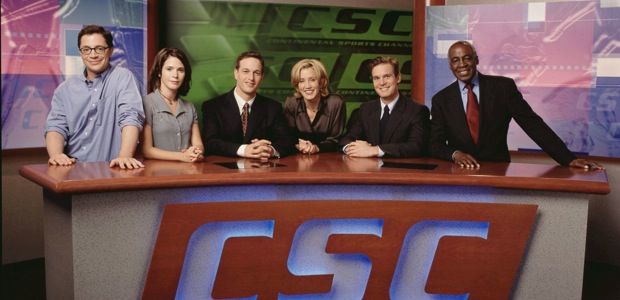With The Newsroom premiering on HBO this weekend, perhaps it's time to reminisce over creator Aaron Sorkin's television career to date. Whether The West Wing or Studio 60, you know what you're going to get when you watch a Sorkin show: Fast-paced dialogue that mixes the smart snark with an almost overwhelming sincerity. And here's where it all began: Sports Night.
Sports Night, which ran for two seasons on ABC between 1998 and 2000, is somewhat of an oddity in Sorkin's career; while it has many of his trademark moves and themes, it differs in format and, in theory, intent, being a half-hour sitcom instead of an hour-long drama. Certainly, at launch, it embraced the sitcom format fairly strongly; not only were plots more pared-down and straight-forward than what they'd become by the end of the first season - and certainly more than they'd end up in the second - but there was even a laugh track throughout the first year to remind everyone where the jokes were (Tellingly, the laugh track went down in volume and usage throughout that first season, as if Sorkin, the producers or the network were slowly realizing, "Yeah, this isn't that kind of show after all").
Like so many Sorkin projects, Sports Night has a love story at its heart - Two, actually; the screwball-comedy-influenced flirting/relationship between sports anchor Casey McCall and his producer Dana Whitaker, and the more neurotic, more straight-forward relationship between two associate producers, Natalie Hurley and Jeremy Goodwin. The workplace romance obsession of Sorkin's was given full play in Sports Night, with the romantic troubles of Casey's co-anchor and best friend Dan Rydell also mixed into everything. Perhaps because of the more obvious unreality of the show - Unlike, say, Studio 60, Sports Night stays away from weightier subjects and pronouncements about society and the media's role in its coarsening for the most part, preferring something much lighter and intentionally throwaway - this kind of thing works better here than in West Wing or Studio 60, but if your taste in Sorkin runs away from his schtickier side, this likely isn't the show for you.
What it is, however, is the show in which you can see Sorkin turn into "that guy who wrote the West Wing" before your very eyes. It happens mostly in the second season - which ran concurrently with the first season of West Wing on NBC - as the show drifts away from the sitcom format more and more, and Sorkin gets both more serious and more… angry, perhaps…? Certainly less willing to suffer fools gladly, as the show starts dealing with heavier topics and the behind-the-scenes wheeling and dealing of the television industry. It's not just the mix of comedy and drama that made The West Wing so compelling that you can see Sorkin perfect as this show winds down; there're also the origins of the self-referential qualities that made Studio 60 so frustrating and, ultimately, alienating to the majority of viewers here, as Sorkin found himself becoming more entrenched in the "entertainment industry" and it began to overwhelm his judgment (Note to television makers: Most people really aren't that interested in the behind-the-scenes stories of what it takes to put a show together unless you include some kind of hook that they can relate to).
Sports Night, then; the work of a younger Sorkin who comes into the height of his powers as you watch, but also starts to sow the seeds of his downfall at pretty much the same time. It's not the greatest show you'll ever see, but if you're a Sorkin fan who's never checked it out, it's more than worth your time.
Sports Night is available on DVD, iTunes and Netflix Watch Instantly, for those who want to check it out.

